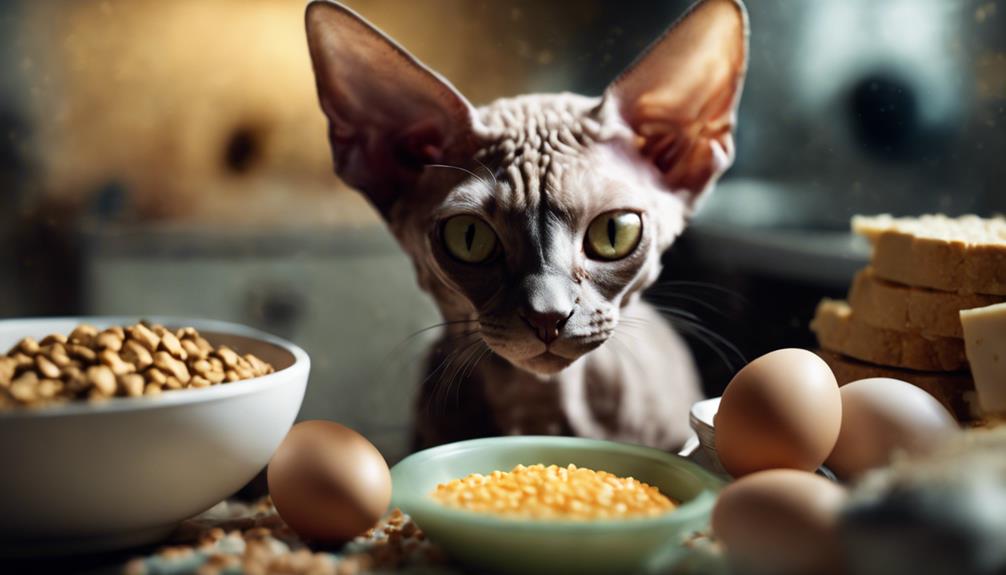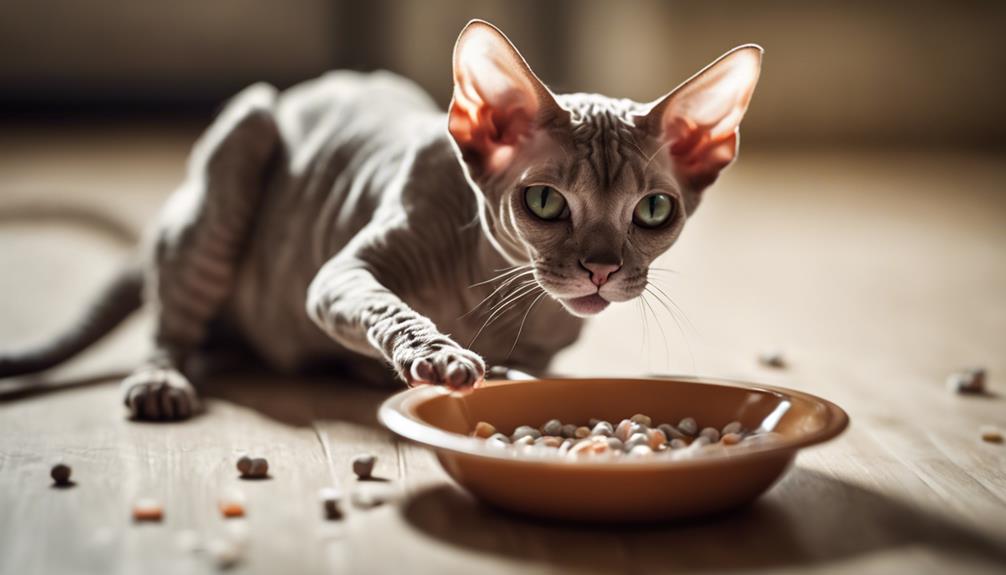Sphynx cats are a unique and fascinating breed of cat. Known for their hairless bodies, these friendly and loyal cats make great family pets. Despite their muscular bodies and medium size, they are playful and love jumping around.
However, like all pets, Sphynx cats can experience health issues. Due to their lack of fur, they may be prone to skin and coat disorders, as well as respiratory problems. It’s important for owners to be aware of these potential issues and take steps to prevent and treat them.
In this article, we will explore some of the most common health problems that Sphynx cats may face and provide tips on how to deal with them. Whether you are a new Sphynx cat owner or have had one for years, this guide will help you keep your furry (or not so furry) friend healthy and happy.
Common Health Issues
Sphynx cats are a unique breed that require special care and attention when it comes to their health. While they are generally healthy cats, there are a few common health issues that owners should be aware of.
Skin Problems
One of the most common health issues that Sphynx cats face is skin problems. Due to their lack of fur, Sphynx cats are prone to oily skin, which can lead to skin irritations and infections. To prevent skin problems, it is important to keep your Sphynx cat clean and dry. Regular baths can help remove excess oils and dirt that can lead to skin problems. Urticaria pigmentosa is another skin problem that can affect Sphynx cats. This condition results in red pigmented spots on the skin.
Dental Issues
Dental disease is another common health issue that affects Sphynx cats. Without regular dental care, Sphynx cats can develop plaque buildup, which can lead to dental infections and tooth decay. To prevent dental issues, it is important to brush your cat’s teeth regularly and provide them with dental treats and toys.
Eye Problems
Sphynx cats are also prone to eye problems such as conjunctivitis and corneal ulcers. These conditions can be caused by a variety of factors including infections, allergies, and UV rays. To prevent eye problems, it is important to keep your Sphynx cat’s eyes clean and free from debris.
Respiratory Problems
Due to their lack of fur, Sphynx cats are also prone to respiratory problems such as upper respiratory infections, asthma, and allergies. To prevent respiratory problems, it is important to keep your cat indoors and away from other animals that may carry infections. Regular veterinary checkups can also help catch respiratory issues early on.
Other health issues that can affect Sphynx cats include weight gain, hairballs, ear infections, and heatstroke. It is important to be aware of these issues and take steps to prevent them. By providing your Sphynx cat with proper care and attention, you can help ensure that they live a long and healthy life.

Hereditary Health Issues
Sphynx cats are generally healthy, but like all breeds, they are prone to certain health issues. Some of these health issues are hereditary and can be passed down from one generation to the next. It is important to work with a reputable breeder who screens their cats’ health to ensure that your Sphynx has a long and healthy life.
Hypertrophic Cardiomyopathy
One of the most common hereditary health issues in Sphynx cats is hypertrophic cardiomyopathy (HCM). HCM is a genetic mutation that causes the heart muscle to thicken, making it harder for the heart to pump blood. This can lead to heart problems, including heart failure, and can be fatal.
Sphynx cats with HCM may not show any symptoms until the disease has progressed. Some signs of HCM in Sphynx cats include difficulty breathing, lethargy, and loss of appetite. If you suspect that your Sphynx cat has HCM, it is important to take them to a veterinarian for a diagnosis.
Hereditary Myopathy
Another hereditary health issue in Sphynx cats is hereditary myopathy. This is a neurological disease that causes muscle weakness and can affect a cat’s ability to walk and move. Signs of hereditary myopathy in Sphynx cats include muscle trembling, abnormal gait, head bobbing, collapse, and exhaustion.
There is no cure for hereditary myopathy, but there are treatments that can help manage the symptoms. Sphynx cats with hereditary myopathy require special care, including regular exercise and physical therapy.
In conclusion, Sphynx cats are prone to certain hereditary health issues, including hypertrophic cardiomyopathy and hereditary myopathy. It is important to work with a reputable breeder who screens their cats’ health and to take your Sphynx cat to a veterinarian if you suspect that they have a health issue. With proper care and attention, your Sphynx cat can live a long and healthy life.
Preventive Measures
Taking preventative measures is key to ensuring that your Sphynx cat stays healthy and happy. Here are some tips on how to prevent common health issues:
Diet
Feeding your Sphynx cat a high-quality diet is essential for their overall health. Sphynx cats are prone to diabetes, so it’s important to monitor their sugar intake. Choose a high-quality food that is low in carbohydrates and high in protein. You can also add supplements to their diet, such as omega-3 fatty acids, to support their skin health.
Exercise
Sphynx cats are playful and affectionate, so it’s important to provide them with plenty of opportunities to play and exercise. Make sure they have plenty of toys to play with, and set aside time each day to play with them. Scratching posts are also essential for their physical and mental health, so make sure to provide them with one.
Temperature Regulation
Sphynx cats are hairless, which means they are more sensitive to temperature changes than other cats. Make sure to keep your home at a comfortable temperature, and provide them with warm blankets to snuggle up in. If you live in a colder climate, consider getting them a sweater or coat to wear when they go outside.
By following these preventive measures, you can help ensure that your Sphynx cat stays healthy and happy. Remember to provide them with plenty of love and affection, and to monitor their health closely. If you notice any signs of illness, be sure to take them to the vet right away.
Grooming Tips
Keeping your Sphynx cat well-groomed is essential for their health and well-being. Here are some grooming tips to help you maintain your cat’s hygiene.
Bathing
Sphynx cats require frequent baths to keep their skin clean and healthy. With no fur to absorb body oils, Sphynx cats can accumulate dirt and grime quickly. You can use a gentle cat shampoo that is soap-free and made with natural ingredients like coconut oil. Bath your cat once a week to keep their skin clean and free from any irritants.
Brushing
Although Sphynx cats don’t have fur, they still require brushing to remove any dead skin cells and excess oils. You can use a soft-bristled brush or a damp cloth to wipe your cat’s skin gently. Brushing also helps to improve blood circulation and distribute body oils evenly.
Ear Wax
Sphynx cats have large ears, with little to no fur or ear tufts. This makes it likely they’ll accumulate more dirt, oil, and ear wax than cats that do have fur, which can cause secondary yeast and bacterial ear infections. Weekly cleaning with a good ear cleaner can go a long way to preventing infection.
Blankets
Sphynx cats are hypoallergenic, which means they don’t shed as much as other cats. However, they still produce body oils that can transfer to blankets and other surfaces. It’s essential to wash your cat’s blankets regularly to prevent the buildup of dirt and oils.
In conclusion, grooming your Sphynx cat is crucial to their health and well-being. By following these grooming tips, you can help prevent skin problems, treat ear wax, and keep your cat’s skin healthy and clean.
Dealing With Health Issues
If you have a Sphynx cat, it’s important to be aware of the common health issues that they may face. While some of these issues are genetic, others can be prevented with proper care and attention. In this section, we’ll discuss some of the common health issues that Sphynx cats face and how you can deal with them.
Treatments
If your Sphynx cat is experiencing health issues, there are a few treatments that you can try. Here are some of the most common treatments:
-
Medications: Depending on the issue, your vet may prescribe medications to help manage your cat’s symptoms.
-
Specialized diets: Some health issues can be managed with specialized diets. Your vet can recommend a diet that is tailored to your cat’s needs.
-
Supplements: In some cases, supplements can be helpful in managing certain health issues. Your vet can recommend supplements that are safe for your cat.
Veterinary Care
Regular veterinary care is essential for keeping your Sphynx cat healthy. Your vet can help you identify any health issues early on and provide treatment before they become more serious. Here are some tips for finding a good vet:
-
Ask for recommendations: Ask other Sphynx cat owners or breeders for recommendations.
-
Look for a vet with experience treating Sphynx cats: Sphynx cats have unique health needs, so it’s important to find a vet who has experience treating them.
-
Consider the location: Look for a vet that is conveniently located, so you can easily take your cat for regular check-ups and appointments.
Health Guarantee
If you’re buying a Sphynx cat from a breeder, it’s important to look for a breeder that offers a health guarantee. A health guarantee can help give you peace of mind knowing that your cat is healthy and free from genetic health issues. Here are some things to look for in a health guarantee:
-
Length of coverage: Make sure the health guarantee covers a sufficient amount of time, such as six months to a year.
-
Specific health issues covered: Look for a health guarantee that covers specific health issues that are common in Sphynx cats.
-
Refund or replacement: Make sure the health guarantee offers a refund or replacement if your cat develops a covered health issue.
By following these tips, you can help ensure that your Sphynx cat stays healthy and happy. Remember to always prioritize your cat’s health and seek veterinary care if you notice any concerning symptoms.
Conclusion
In conclusion, Sphynx cats are a unique and fascinating breed that requires special attention to their health needs. As a hairless breed, they are prone to certain health issues such as respiratory problems and ear infections. However, with proper care and attention, these issues can be managed effectively.
One of the biggest advantages of owning a Sphynx cat is that they are hypoallergenic, making them an ideal pet for those who suffer from allergies. However, it is important to note that while they may not cause allergies, they still require regular grooming and cleaning to maintain their skin health.
Sphynx cats are known for their big personalities and energetic nature. They are a loyal breed that loves to cuddle and be close to their owners. To keep them warm and comfortable, Sphynx cats may benefit from wearing sweaters or using heated cat beds during colder months.
In terms of their history, Sphynx cats are a relatively new breed that originated in Canada in the 1960s. Since then, they have gained popularity around the world due to their unique appearance and lovable personalities.
Overall, Sphynx cats make great indoor pets that require special care and attention. With proper care, they can live long and healthy lives, providing their owners with years of love and companionship.




